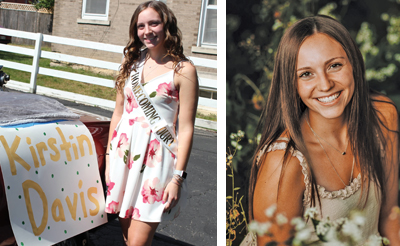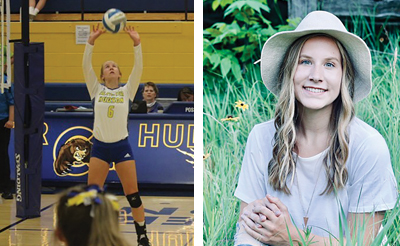
Positive about the Future
2022–2023 CETA Scholarship Winners
By Diane M. Calabrese / Published September 2022
The nine 2022–2023 CETA Scholarship recipients give us so many reasons to be positive about the future—and the present. Among the awardees are aspiring computer and animation professionals, nurses, occupational and physical therapists, communication experts, and international policy makers.
In a larger context, the scholars represent wholly- rounded individuals who will take important roles in homes, workplaces, and society at large.
Here we introduce (in alphabetical order) each of the nine scholars. Keep in mind when reading the introductory nuggets that to a one, the scholars express their thanks for the scholarship assistance.
The common refrain among the scholars: This (university, course of study, etc.) would not have been possible without the scholarship. And they are grateful to have had the opportunity to apply for—and to have received—an award.
The “sponsoring company” listed beneath the name of each CETA scholar is the CETA-member company that contributed to the scholarship. The “member company” cited for each applicant is the manufacturer, distributor, or supplier affiliation that made the scholar an eligible applicant.
Skip to the sidebar to review the mechanics of the CETA Scholarship application and selection process. (Also see the companion article in the October issue of Cleaner Times on CETA Scholarship Foundation Trustees to learn more about that group’s how and why.)
 Samuel Bishop
Samuel Bishop
(Sponsoring company—Alklean Industries Inc. in memory of John Purswell Jr.)
A computer science major with an animation emphasis, Samuel Bishop is a senior at Brigham Young University in Provo, UT. A summer internship at Iterable, a tech company in San Francisco, CA, left him with a positive view of the company’s approach to “good corporate citizenship,” he explains. “I have been very impressed with the company’s responsible attitude toward a work-life balance and strong advocacy around social issues.”
Bishop says a similar, widely replicated approach to “good corporate citizenship” is one that would benefit all. And it’s an approach many already take. “I realized CETA is doing good work in the same vein by providing scholarships to the rising generation.”
(Member company—Kärcher)
 Paige Davidson
Paige Davidson
(Sponsoring company—Hotsy of Minnesota)
Committed to a double major in biology and art, Paige Davidson looks forward to a career in medical illustration. She begins her studies at Gustavus Adolphus College this fall.
Davidson tells us she learned—taught herself—a valuable lesson during her senior year of high school. That is the power of determination.
A bit trepidatious about a college-level algebra course, Davidson prioritized it. She also sought help when she needed it and discovered help was there from other students and her teacher. “Despite only being two trimesters, this course taught me the value of seeking help and collaboration in pursuit of success, a lesson that will continue to help me way beyond math courses into real life,” she says.
(Member Company—Cat Pumps)
 Kirstin Davis
Kirstin Davis
(Sponsoring company—CETA)
Pursing a degree in elementary education, Kirstin Davis is a freshman at the University of Northern Iowa. Her choice of major was greatly influenced by her K-12 experience with teachers who taught her to persevere and make connections as well as learn subject matter.
“I have looked up to each and every teacher I have had,” says Davis. “I knew I wanted to teach, and it was calling my name. I want to give the school experience I had to other children and get to see the excitement and enthusiasm on their faces as they learn and achieve.”
(Member company—Mi-T-M Corporation)
 Kate Evans
Kate Evans
(Sponsoring company—Etowah Chemical Sales and Service)
A senior at Auburn University, Kate Evans studies nursing. Clinical experiences, such as visiting a hospital or community organization to work with patients, have been very important to her professional development.
“From these experiences, I have learned more about what the role of a nurse is and what it looks like to care for someone well,” says Evans. “It is very important for me to create trusting relationships with patients, and my clinical experiences have really helped me to do so.”
(Member company—Evans Equipment)
 Olivia Nicole Harris
Olivia Nicole Harris
(Sponsoring company—Chappell Supply and Equipment)
Dental hygiene is the subject of study for Olivia Nicole Harris. She attends Gadsden State Community College.
Harris says that she brings to her studies a great learning experience from her role as head yearbook editor during her last year of high school. The varied responsibilities tied to that role—taking professional photos, organizing group events, editing pictures, and performing graphic design—gave her a fresh perspective on leadership.
“Being a leader is about much more than ‘being in charge’; it is about helping each other and making things work,” says Harris. “No matter what I choose to do with my life, I must always strive to be a good leader and a team player.”
(Member company—Etowah Chemical Sales and Service)
 Sophia Johns
Sophia Johns
(Sponsoring company—Royce Industries, L.C.)
A freshman at the University of Central Arkansas, Sophia Johns is majoring in communication with a minor in international studies. She explains a move to a new high school during her junior year brought the idea of a communication major to the fore.
“I learned the importance of communication skills and styles through making new friendships and relationships,” says Johns. “Little Rock Christian Academy also heavily taught the Harkness method, a way of learning that involves students communicating with each other around a table.”
A senior year of oral presentations and essays in the classroom were so enjoyable, says Johns, that when a friend suggested considering a communication major, she did.
(Member Company—Cleaner Times)
 Hope Nelms
Hope Nelms
(Sponsoring company—Lease Consultants)
Starting her second year at Texas A&M University, Hope Nelms looks back on all she learned during her first year. Her skills in organization and meeting deadlines were sharpened, friendships were begun, and her cooking ability improved.
“Through all of it, I was constantly reminded of what a blessing it is to be able to further my education at a great university,” explains Nelms. “None of this would be possible without this scholarship…”
In addition to academic pursuits, Nelms was able to join the university’s club tennis team. “It was fun to be able to challenge myself academically and forge new friendships with my teammates.”
(Member company—Action Cleaning)
 Bayleigh Peterson
Bayleigh Peterson
(Sponsoring company—Pacific Bay Equipment)
A sophomore at the University of South Dakota, Bayleigh Peterson is studying kinesiology and sport management for occupational therapy. She says her first year at the university was everything she could have hoped for and more.
In the first semester of her college studies, Peterson took a course in which all the elements that factor into a person’s health were explored. What she learned helped prepare her in multiple ways “to better serve others,” she says.
Peterson explains she has strengthened herself physically and spiritually in addition to academically
during the last year. “Going to the gym to weight train, playing basketball with friends, running, or attending a yoga class has boosted my physical health immensely,” she says. “I have also further developed my relationship with Jesus and his sacrifice for our salvation by starting my day with a devotional, attending church every Sunday, and trusting in his path for me.”
(Member company—Alkota Cleaning Systems, Inc.)
 Darby Woodrum
Darby Woodrum
(Sponsoring company—Chappell Supply and Equipment in memory of Blake Chappell)
A single high-school course persuaded Darby Woodrum that she had a calling to the profession of nursing. She is now a student at East Texas Baptist University.
Unsure of what or where she wanted to study, Woodrum took a course about clinical medicine in her senior year. “I thought I might be interested in the medical field,” she says. “The class confirmed this for me.”
Learning about the human body and medicine, coupled with job shadowing, put Woodrum on her current path. “The course allowed me to see many different areas, which helped me decide I wanted to be a nurse,” explains Woodrum.
(Member company—Action Cleaning)
CETA Scholarships—The Basics
The CETA Scholarship Foundation provides scholarships to nine qualifying applicants (students of CETA members or their employees) annually. An applicant must be a full-time student for the academic year beginning with fall semester at a college, community college, technical college, university, or graduate school. Three scholarships are awarded in each of the three eligible membership classes: manufacturers, suppliers, and distributors. A ranking of applicants by an independent evaluator at an accredited university determines scholarship recipients. If a qualified applicant cannot be identified in one or more of the membership classes, one (or more) at-large scholarship(s) is awarded to the remaining applicant(s) with the highest ranking(s) regardless of his or her membership class.
CETA member companies that sponsor scholarships gain recognition. Any member company may pledge any amount for scholarships. The company is then added as a sponsor on the scholarship and recognized at all CETA meetings. Funds donated beyond those required to support nine annual scholarships are added to an endowment with the aim of creating a self-funding scholarship program.
For more details on the CETA Scholarship Foundation, see www.ceta.org.






